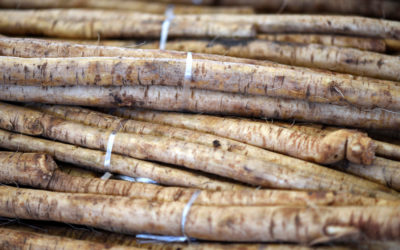For centuries, the unusual looking violet and white passionflower (Passiflora incarnata) has been used as a calming botanical treatment. Its use dates back to the Aztecs in Central America who used parts of the vine to treat insomnia. Native Americans used it to soothe inflammation in wounds. Spanish conquistadors brought passionflower to Europe and from there it made its way to North America. As the herb traveled the world, new uses were discovered. It has been used as a calming tonic for babies during weaning, to tame anxiety, and to support a general state of relaxation. Today, passionflower has therapeutic uses as a gentle sedative to reduce anxiousness and as a sleep aid.
The exact pathways through which passionflower brings about calming effects are still being studied. We know that some compounds in passionflower bind to the same areas of brain cells affected by a neurotransmitter known as GABA. Like GABA, passionflower soothes the nervous system by reducing activity in certain brain cells, resulting in a relaxation response.
There are many ways to use passionflower: loose leaf and bagged tea, capsule or tablet, and tincture. Drowsiness and dizziness can occur when taking passionflower. When taken with other medications, it can increase the effects of those medications. Passionflower also contains compounds that can stimulate the uterus, so it is not suitable for pregnant women. Before using passionflower in any form, give us a call.
Since 2002, we have been treating patients for a number of ailments. We have seen great improvements in our patients and would love to help you with what you’re dealing with as well. Our office is located in South Central Austin, Texas. Give us a call, we’d love to see you and get to the source of what you’re dealing with.
Douglas and Vanessa Rutkowski, LAc, Dipl OM, MSOM, ACN, ART Practitioners
Tigerlily Wellness & Acupuncture
2111 Dickson Drive, Ste. 26
Austin, TX 78704
512-899-8996
________________________________________________________________________________________________
Resources
Johnson, R.L., S. Foster, Low Dog, T. and Kiefer, D. National Geographic Guide to Medicinal Herbs: The World’s Most Effective Healing Plants. (2012) Washington, D.C.: National Geographic.
HealthLine.com “Calming Effects of Passionflower.” Accessed 9 Oct 2020: https://www.healthline.com/health/anxiety/calming-effects-of-passionflower
Mars, B. & Fiedler, C. (2015). The Home Reference to Holistic Health & Healing. Beverly, MA: Fair Winds Press.
Bennett, Robin Rose. (2014). The Gift of Healing Herbs. Berkeley, CA: North Atlantic Books.
Hoffman, D. (2003). Medical Herbalism. Rochester, VT: Healing Arts Press.



